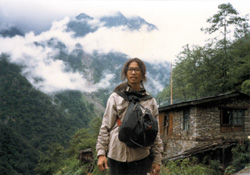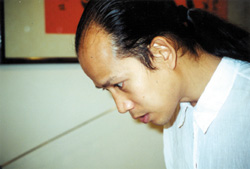 Online
Edition
Online
Edition | From
the editor Letters to the editor Milestone Answerman Periscope Campus Life Social Issues People Photo Features Education Channel Culture & Leisure Science |
| Last
Issue Archive |
| About
Varsity Advertise Media Links CUHK homepage JLM homepage |
Also
in People
Szeto Wah
Write to us
Back to main
![]()
Turning the wheel of fortune
By Shirley Lai
Mr. Peter So Man-fung, formerly a hairdresser, is now a fortune teller and feng shui (Chinese geomancy) expert.
His predictions of celebrities?fortunes often appear in newspapers and magazines.
He also hosts many live television programmes and radio shows, predicting people’s fate.
Question: When did you start studying fortune telling and feng shui?
Answer: When I was a hairdresser trainee, I started reading books about fortune telling and feng shui. In 1982, my first master, Mr. Ng Man Hin, taught me the techniques of predicting people’s fates by using their birthdays. Fourteen months later, I began to work nightly at Master Ng’s stall in Temple Street. There, I practised the techniques and gained experiences. Then, I learned palm reading (telling one’s future by reading the lines on the hand) from another master, Mr. So Long Tin. Afterwards, I refined my skills by learning independently and studying clients?cases.
Q: Why do you wear your hair so long? Does it bring good luck?
A: I have had long hair since I was a hairdresser assistant. To keep it this length, I cut my hair only once a year. This has nothing to do with my fate, but it is my lucky charm.
Q: What do you think of other people’s comments about your personal style?
A: I am indifferent to their comments. When I was not famous, people criticised my image. They thought my long hair was too stylish and that it destroyed the profession’s image. But now people think I am stylish and trendy.
Q: Many of your clients are artists and singers. Do you intentionally specialise in serving them?
A: To me, there is no difference between a celebrity and an ordinary person. I am a fortune teller and I know what my duties are. I do not judge people by their social status.
Q: What
is your unique style of “fate calculation??/font>
A: It is
just like chatting with friends. By knowing their birthdays and looking
at their faces, I can tell their destinies. I can also tell their personalities
and characters. These things actually reflect people’s strengths and weaknesses.
I also help my clients to build up their self-esteem.
Q: This
kind of problem solving is somehow the same as what a psychoanalyst does,
right?
A: No. A
psychoanalyst can assess a person's problems only after several conversations.
For me, I can find out what is wrong with my client immediately, without
knowing his background and experience. Besides, a psychoanalyst believes
a person’s misfortunes are mainly due to bad experiences in early life.
“Fate calculation?tells you to accept your own problems and the subsequent
fate. One’s fate is scheduled and cannot be changed. Therefore, one should
learn how to lead an easier life under various limitations.
Q: How would
you deal with a client who wants you to make him rich?
A: I would
tell them there is no formula for prosperity. If there were one, why would
I not boost myself first? Actually, I would not welcome such a client.
Q: According
to “fate calculation? people who have the same birthdays should have
similar fates. So, would you say identical twins have same fate?
A: Basically
correct. It is easy to understand that identical twins have got the same
genetic codes. However, they are somehow slightly different in many aspects.
The different nourishment they receive as they grow up can account for
this.
Q: If you
predicted bad fortune for a client, would you tell him the truth?
A: Yes,
of course. It is my duty to tell my clients all their future, no matter
if it is good or not. If you unfortunately had cancer, would your doctor
tell you the truth? It is the same. We both handle people’s problems and
suggest methods to solve them. A doctor would certainly try his best to
cure the disease. However, he cannot bring the dead back to life. The
patient or the client has to bear all the results.
Q: Have
you ever predicted your own fortune?
A: Yes,
I have calculated my own fate. I know I am now at the climax of my life
and I will retire in 5 years. I will have never get married, but this
will not affect my destiny. From 45 to 55, I will experience 10 years
of hard times. After that, there will be another 30 years of good fortune.
I do not mind disclosing my own fate to others, as I believe one’s fate
is already scheduled and cannot be changed.
Q: If so,
because you also know the solutions to bad luck, you would probably lead
a successful life, wouldn’t you?
A: I dare
say I would have a more comfortable life rather than a successful one.
At this stage, earning money is not my goal anymore. I will probably think
about how to lead a happy life and my ideal lifestyle. That is why I will
not force myself to do anything I do not want to.
Q: Have
you ever doubted the credibility of “fate calculation?
A: Yes,
I have. That was the time when I was not experienced enough and mistakes
did happen at times. However, this is not the case anymore.
Q: Have
you ever felt bored by your profession?
A: It is
boring to see so many people every day. Besides, others can hardly understand
my theories and thinking. I cannot tell others what level I have achieved
already.
Q: What
satisfaction do you get from being a fortune teller and a feng shui expert?
A: I gain
both money and happiness by helping the others. Fortune telling and feng
shui are my interests. I am still exploring the scope of the subject and
new ideas continue to emerge.
Q: How would
you analyse the prospects for several universities in Hong Kong?
A: I think
the success of a university does not only depend on its academic performance,
but also its geographical location. This is what we call feng shui. Universities
that are located on the western side of Hong Kong, near the sea, are having
good feng shui now. ![]()
|
Courtesy
of So Man-fung
 So Man-fung in Tibet 15 years ago. |
|
Shirley
Lai
 Mr. So says that the success of a university depends not only on its academic performance but also its feng shui . |